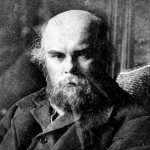The path by which we twain did go,
Which led by tracts that pleased us well,
Thro' four sweet years arose and fell,
From flower to flower, from snow to snow:
And we with singing cheer'd the way,
And, crown'd with all the season lent,
From April on to April went,
And glad at heart from May to May:
But where the path we walk'd began
To slant the fifth autumnal slope,
As we descended following hope,
There sat the Shadow fear'd of man;
Who broke our fair companionship,
And spread his mantle dark and cold,
And wrapt thee formless in the fold,
And dull'd the murmur on thy lip,
And bore thee where I could not see
Nor follow, tho' I walk in haste,
And think, that somewhere in the waste
The Shadow sits and waits for me.





Comment form: